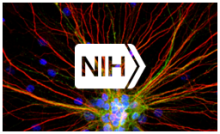
Last month, members of the Multi-Council Working Group (MCWG) met virtually to discuss the current state of the NIH BRAIN Initiative and to learn about new chemical and synthetic biology technologies.
On May 16, 2022, the Multi-Council Working Group (MCWG) heard from Dr. John Ngai, Director of the NIH BRAIN Initiative and chair of the MCWG. The MCWG coordinates efforts across the NIH and provides input on the long-term scientific vision of BRAIN. Dr. Ngai provided an overview of the NIH BRAIN budget through fiscal year (FY) 2026, noting the $620M budget for FY2022 and an anticipated increase in funding for FY2023. He summarized recent events, including the Brain Behavior Quantification and Synchronization workshop, which brought together experts in neuroscience, engineering, and computer science to identify technological gaps in studying and understanding behavior, and the Brain Across the Lifespan workshop. He also promoted the upcoming 8thAnnual BRAIN Initiative Meeting on June 21-22, 2022, and mentioned two activities, the BRAIN Initiative Challenge: “Ethical Considerations of Brain Technologies” essay and video contest for U.S. high school students and the annual BRAIN Initiative Show Us Your BRAINs! Photo & Video Contest.
Next, Dr. Ngai discussed findings from a demographics analysis of BRAIN investigators from FY14 – FY21(pdf, 1142 KB). The evaluation found that NIH BRAIN Initiative funding rates for women and/or underrepresented groups were lower compared to the NIH overall, while funding rates for R1 institutions and those located in coastal states were higher than lower resourced institutions. There were no discernable funding rate disparities between women and men and URM and non-URM researchers.[K[1] [D[2] Early- and mid-career applicants had favorable funding rates compared to later stage career applicants. He also emphasized new efforts to assess race, ethnicity, and gender in the research participant pool. Dr. Ngai discussed how BRAIN is promoting scientific excellence by enhancing diversity, equity, and inclusion capacity building awards at minority-serving institutions, incorporating the Plan for Enhancing Diverse Perspectives (PEDP) into the grant application process, and other efforts.
The meeting proceeded with an update on Neuroethics Working Group (NEWG) activities by Hank Greely, JD, Director of Law and Biosciences at Stanford University and co-chair of the NEWG. Dr. Greely mentioned a recent NEWG workshop on continuing trial responsibilities, which focused on research-related care needs for participants in clinical trials involving implanted neural devices.
After the NEWG update, Dr. Bryan Roth (University of North Carolina, Chapel Hill), an MCWG member, gave a presentation on his research on novel chemical and synthetic biology technologies. Dr. Roth described his quest to identify new promising therapeutics by examining the hundreds of understudied, untargeted G protein-coupled receptors (GPCRs) in the human genome. For example, lysergic acid diethylamide has recently shown great potential as a safe therapy for anxiety and depression. Understanding the drug’s binding properties could lead to the development of non-psychedelic therapies for neuropsychiatric conditions. Meeting participants discussed ways to ensure that new drugs cross the blood-brain barrier, developing novel radioligands, and the importance of looking at downstream molecular signaling pathways.
For more details on meeting discussions, please read the meeting summary(pdf, 148 KB) and archived videocast. The next NEWG and MCWG meetings will take place on August 23 and 24, 2022, respectively.
